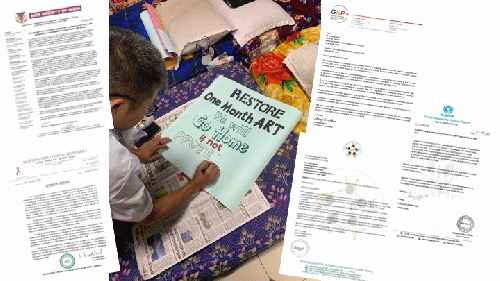Growing support globally to end HIV medicine stockouts in India
BOBBY RAMAKANT - CNS

Global networks to national and state networks of India appeal to end stockouts of HIV medicines
(Image by CNS) Details DMCA
Several networks of people living with HIV are pouring in support to the ongoing indefinite sit-in (since 21st July 2022) outside offices of India's AIDS programme, to demand an end of stockout of HIV medicines, and ensure minimum one-month dispensation of these medicines nationwide.
The government of India's guidelines of 2018 state that those persons stable on the HIV therapy should get three-months' supply of these medicines. But ground reality is that people in several states are getting 3-10 days supply, or children getting medicines for adults or vice versa.
This indefinite stir began on 21st July 2022 with Delhi Network of Positive People (DNP Plus) activists leading the crusade to end stockouts of essential medicines. These networks who have written support letters for DNP Plus and submitted to the Government of India include the Global Network of People Living with HIV (GNP Plus), National Coalition of People living with HIV (NCPI Plus), Manipur Network of Positive People (MNP Plus), Global Alliance for Human Rights, among others. National professional association of HIV medical experts and researchers (AIDS Society of India - ASI) have also written to the Government of India's Prime Minister, Minister of Health and Family Welfare, and National AIDS Control Organization (NACO), supporting the above demands.
Since the first HIV clinic was opened by AIDS Society of India (ASI) co-founder and President Dr Ishwar Gilada when first case got diagnosed in India in 1986, India has come a long way in reducing number of new HIV infections, as well as scaling up lifesaving (and lifelong) antiretroviral therapy to around 1.6 million people.
"The gains made by India in fight against AIDS can be lost if drug supplies are not stable. There is ample scientific evidence to show that when a person is stable on antiretroviral therapy and virally suppressed, she/he/they will have the same life expectancy as an HIV-negative person of the same age in similar context. Antiretroviral therapy prevents HIV-related illness and disability and saves lives. Antiretroviral therapy also has a prevention benefit. The evidence is now clear that people living with HIV with an undetectable viral load cannot transmit HIV sexually (undetectable equals untransmittable or UequalsU). According to the UNAIDS and WHO, HIV treatment works best when taken as prescribed. Missing doses and stopping and re-starting treatment can lead to drug resistance, which can allow HIV to multiply and progress to disease," wrote Dr Ishwar Gilada, national President of ASI and Governing Council member of International AIDS Society (IAS).
(Note: You can view every article as one long page if you sign up as an Advocate Member, or higher).





